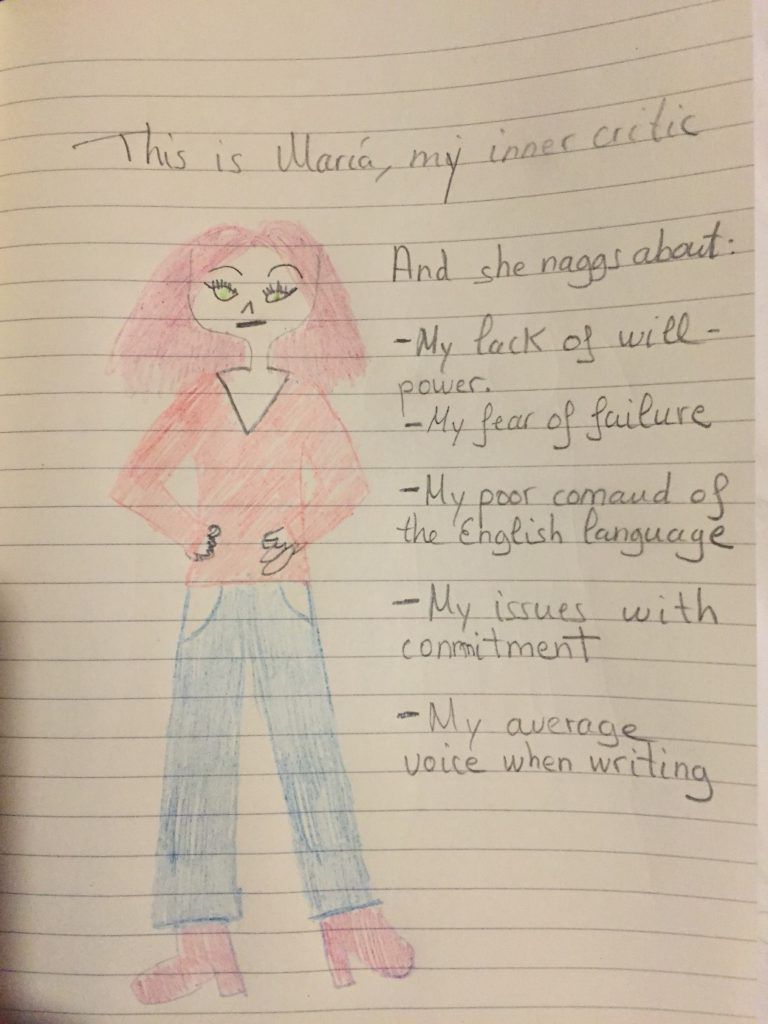Blogging is not easy.
When you think about it, it makes you shiver and in the end you find a thousand excuses not do it.
I don’t have time, I don’t know what to write about, I don’t write well.
But, if you have a business, you need to have a blog, unless you have a huge budget to invest in advertising.
If your budget is quite anaemic like mine, and after paying bills and continuing to invest in education, you don’t have much money left to pay for ads, you’re going to have no choice but to write a blog.
Creating excellent and frequent content will give you the visibility you need on the Internet to get more customers.
There is no other way.
Content marketing is becoming more and more relevant as customers opt for brands they already trust.
If you offer quality content, prospects will find you because your blog will be in the first positions of Google, and they will trust you since your content offers valuable help.
And who will they think of when they’re ready to buy?
Exactly, you.
Writing a blog takes time and effort but it’s worth it because it will bring you great results.
If you publish with certain frequency and offer quality you will see them, little by little.
To achieve your goals and not fail you need to create a writing habit, because, otherwise, it’ll be easy to opt for the inaction and not publish anything for weeks and weeks, and then publish 2 articles in a day.
This way you won’t go far.
Ideally, you should publish a new post at least twice a month.
There are several tactics for turning writing into a habit, like brushing your teeth.
I don’t think anyone loves brushing their teeth, but it’s an activity that’s so engraved in our routines that we do it without thinking.
This is how writing can become, just one more part of your daily life.
But to write, you need to think!
What I mean here is that you shouldn’t think too much about doing it.
As Stephen King says in his wonderful book “On writing”:
“The scariest moment is always before you start. After that, things can only get better”.
So let’s get on with it.
Let’s look at all those tips to create a writing habit.
1. Create a space in your calendar for writing
The best way to create a habit and not procrastinate on that activity is to reserve a space in your calendar.
Seeing that block dedicated only to writing will drive you to comply.
The ideal is to write first thing in the morning when your mind is fresh and you’re not thinking about a thousand other things yet.
Many books about writing recommend you to start straight away after you got up, without having breakfast or anything, just a cup of coffee if you like coffee.
I can’t do that.
I need breakfast in the mornings in order to wake up.
But writing is the first thing I do after breakfast.
I even only take a shower after I’ve finished the time I’ve set to write.
You can decide what works best for you, what I want you to remember is that you need to book writing time in your calendar and stick to it.
2. The importance of creating a ritual
I’m sure you’ve seen a lot of football players who, before entering the pitch, tap their shoes or do the sign of the cross.
Rafael Nadal usually puts his hair behind his ears before he serves, even when he wears it short…
They’re little rituals that trigger a habit.
Ok, some sportsmen and women do it out of superstition, but the truth is that these little gestures prepare them psychologically to win.
You can create your own little ritual that you will repeat every morning before sitting down to write.
It’s a way of preparing your mind and nudge it to perform that activity.
This little ritual can consist of making yourself a coffee and turning on the computer with your favourite mug in the other hand.
Or you might do some small exercises to stretch your back just before you sit down.
Or even a couple of yoga sun salutations.
This little ritual shouldn’t be too long, otherwise, it can distract us from what we really have to do.
Writing.
3. Avoid distractions
It’s very important that while you write you don’t check your emails or social media.
These distractions cause our minds to travel to hundreds of destinations instead of concentrating on writing.
Set in your calendar some time to respond to emails and to check social media.
It must always be after you have achieved your daily writing goals so that an email or a post on Facebook doesn’t change your mood.
If the temptation to check WhatsApp is too strong, leave your mobile phone in another room in silence mode.
If this is not the case, it may be enough to place your phone face down on your desk, but always set in silence mode.
If you need to search for some information for your article, don't do it in your writing time but at another time of the day. Share on XIf you open Google you run the risk of going into a dead-end spiral and when you will finally realize you’ve been reading articles for half an hour.
You started reading statistics about how many people live alone and you don’t know how you ended up watching a video of a guy who makes soap bubbles through his nose.
This is very dangerous, so don’t open Google!
If you need to check a piece of information while you’re writing include a note to look at it later when editing.
4. Set a daily goal and stick to it. No excuses
Some people work better with a minimum of words a day. It can be 500 or 1000 words.
Set yourself an achievable goal and don’t aim too high, 100, 200 words to start with.
You can always increase this number over time.
If you set yourself a word goal, you won’t be able to stop until you’ve written that amount.
Other people, like me, prefer to set time goals.
Half an hour, an hour, two hours of writing. It’s up to you.
And you can’t leave it until you’ve completed that time.
With practice, the number of words you write in a given time will increase.
But I also tell you that there are better days than others.
There are days when it will take you ages to write 2 lines, but the important thing is that you have shown up.
You’ll see that the next day you’ll write more.
Try it.
But during your writing time you don’t look at your phone, you don’t trim your eyebrows and you don’t clean the windows either.
You just write.
5. The old Pomodoro technique
It’s old but it’s still valid because it works. As simple as that.
Francesco Cirillo came up with this technique, which is why it’s called Pomodoro, which means tomato in Italian.
The name refers to those tomato-shaped kitchen timers our mothers used.
Well, mine never used it, but I believe many others did since they didn’t have iPhones with electronic timers.
This technique consists of setting a timer and write non-stop at 25-minute intervals.
At the end of those 25 minutes, when the alarm goes off, you stop writing. And it doesn’t matter if you’re in the middle of a sentence, you just stop.
Then you rest for 5 minutes, or 10 minutes, depending on your writing goals, and after that break, you reset again the 25-minute timer, where you only write non-stop.
You don’t go to the toilet or the kitchen to get another coffee.
You just write.
I use this digital pomodoro and it helps me a lot.
The Pomodoro technique facilitates concentration and increases productivity.
The brain’s ability to concentrate when it knows it has a limited time is incredible.
How to build a writing habit for your blog #blogging #contentmarketing #SEO Share on X6. Write without correcting
The best way to let ideas flow is to write without correcting or rereading what you have just typed.
The part of the brain we use when we create something out of nothing is not the same as the one we use when we are correcting a document.
If you start correcting as you write, first you will affect your creative part since you interrupt it all the time and second you will not correct effectively, since your brain is in creative mode, and you won’t see mistakes so easily.
When writing, do it without stopping and without judging too much what you are spitting on the page.
The process of writing is something like spitting out everything you have inside of you that you think can help others.
Let those ideas come out and let even more ideas emerge with the process of correlating.
Correlating is what we actually do when we write an article, an essay and even a novel.
Ideas are already there, what we do is bring them together by creating new combinations.
So don’t be scared to write about something that has already been written about a thousand times before.
You may have a different combination of those ideas that results in a new and revealing point of view.
If you don’t write about it, you may never reach that conclusion.
But you need to let your mind create those combinations as freely as possible.
7. Make peace with your inner critic
It’s going to happen to you too.
As you write you’ll hear a voice, with a cynical timbre, that will whisper to you (or even scream, sometimes) that what you are writing is rubbish and that you are wasting your time.
It’s your inner critic.
That voice has been formed over the years and is a result of all your insecurities.
That voice, sometimes deafening, is partly that teacher who put you in the spot in the middle of the third-grade class.
It’s also that parent who yelled at you at games saying you weren’t running fast enough.
And it’s also that parent who wouldn’t let you climb the sledge because he was afraid you’d fall.
That voice is formed by all the fears and frustrations acquired in your childhood and it’s simply a shield that tries to protect you from yet another disappointment.
The problem is that your inner critic’ voice can impoverish your life if you listen to it, and not let you do the things you really want to do.
If you listen to what she tells you, you will never work hard to get what you want.
So you shouldn’t pay attention to it.
At least not when you’re writing.
But don’t try to shut her up. That’s not going to work.
Your inner critic is very persevering and will speak to you again and again to try to bring you back to a stage of inaction.
Don’t get mad at him.
Try to reassure him telling him not to be afraid, perhaps what you’re doing might be s**t, but you want to do it anyways and you’ll see tomorrow when it’s time to review it if you can improve it.
Some time ago I did the online course Write it, Don’t fight it, by Henneke Duistermaat. She is an important reference for me.
I recommend you to do this course, especially if you’re serious about writing, whether it’s a blog or a book.
This course helps you overcome all those mental barriers we come up with when we want to create anything.
It also teaches you how to be a more prolific writer and to be more efficient.
In one of the sections of the course, Henneke asks you to draw your inner critic.
This is to help you to come to terms with her.
I did draw her, even if I draw really badly…

My inner critic looks a bit like me but has a different hair colour and sharper teeth.
Her name is Maria.
Once we’ve drawn our inner critic, she asked us to write 3 or 4 things on the side that your inner critic tells you when you’re creating something.
Maria tells me:
– You’ll never get anywhere with your writing
– There are hundreds of better writers than you
– You started taking this seriously too late
And other jewels like these.
So what Hanneke advises us to do is to comfort our inner critic and pass an arm around her shoulders while inviting her for a coffee.
Your inner critic tells you all these things because she’s really scared and doesn’t want you to suffer.
So what you have to do is to tell her that it’s ok, that you’re not going to suffer and that you really want to write.
Write next to the things she tells you, your replies. I wrote these:
– Okay, maybe I won’t get anywhere with my writing but I do it because I like it and because I can’t conceive my life without writing.
– There will always be better writers than me but that’s no reason to stop writing. Besides, the more I write the better I’ll become at it.
– It’s never too late to do what you really like. Yes, you’re right, I could have taken this seriously years ago and I never dared, but now it’s my time and I plan to make up for all the lost time practising as much as I can.
These are my answers to her concerns.
Don’t try to argue with her because she’ll get mad, just tell her that you’re ready and that she doesn’t have to be scared.
In reality, your inner critic fulfils its function since you also need a critical part to judge what you have written.
Although you don’t need her when writing, but later, when you need to edit your draft.
How to build a writing habit for your blog #blogging #contentmarketing #SEO Share on X8. Reserve enough time to edit with your inner critic
Don’t look at your draft during the next 24 hours and edit it the next day or even 2 days later.
Leaving at least 24 hours will help you to read it with a fresh and somewhat more objective look.
It’s at this point when your inner critic can help you see grammatical errors or phrases that are not well structured.
Also, fuzzy ideas that are not clear and need some depth, such as statistics, studies or quotes.
Being specific is important to show credibility.
It’s at this precise moment when your inner critic can be of use to you.
Because she will see unclear ideas and mistakes and will help you transform your average draft into a great piece.
You will be surprised at how many times, having finished your draft the day before thinking it was rubbish, when editing it you will think that it isn’t that bad at all.
You will find very good ideas that perhaps you should simply polish so that they shine in all their splendour.
Yes, there will also be parts that you think, god, this is awful.
It’s here where you can add some depth, by including information you have read from another article or including a personal story, and so on.
All this will turn your mediocre paragraph into an important part of the article.
Take your time editing and try to cut your draft in order to leave only those words that are essential for your message.
Check out for those clichés that don’t add anything interesting, for boring repetitions, cut those monstrous paragraphs and simplify the language.
Delete adverbs that make the text too dense and add action verbs that endow the text with energy.
After all, your inner critic sometimes knows what she is doing.
How to build a writing habit for your blog #blogging #contentmarketing #SEO Share on X9. Make your life easier with an editorial calendar
Instead of thinking every week about what you want to write, reserve an afternoon each quarter to create an editorial calendar with the topics you’re going to talk about in the next 3 months.
Research the web, read books, talk to clients and colleagues, write down ideas whenever they come to mind, and then spend a couple of hours every 3 months creating your editorial calendar for the coming months.
You can also include a column with the keywords you’ll use on each post so you don’t waste time doing keyword research once you start writing.
This way, you let the part of your brain that creates phrases and relates ideas flow freely so you get the best out of yourself in every draft.
Having an editorial calendar is a way to avoid writer’s block
Because every morning you’ll know what you’re going to write about.
There are writers who don’t follow this technique and prefer to decide the night before on what they are going to write the next day.
They also organize their calendar the day before with tasks for the next day.
I prefer to do my weekly planning first thing each Monday and the editorial calendar once a quarter.
Choose what works best for you.
Ideas for posts come to me at any time, so I always have my OneNote app open on my laptop or on my phone. Then I can write them down and don’t let them blow away with the wind.
What happens is that very often when I sit down to create my quarterly editorial calendar, I already have much of the work done and I just have to search for keywords.
Conclusion
If you put these 9 tips into practice you will be able to write a blog that attracts more prospects to your website.
I stick to these techniques (almost always, I’m not a Buddhist monk either) and they are helping me to write in a more efficient way and to be disciplined.
Some time ago I read an article that was revealing for me.
It said that willpower is an emotion, and as such, it comes and goes, so we can’t always count on it.
You can’t practice willpower like a muscle either so if you do certain things just out of obligation there’ll be a moment where you feel overwhelmed and won’t be able to stick to it.
The first thing you have to ask yourself is if writing is important to you
If the answer is yes, you need to turn it into a habit not to depend solely on willpower.
Habits are done almost without thinking and therefore we don’t need to use willpower to stick to them.
This way we don’t spend those “willpower reserves” we need to do other things that cost us a lot of effort, such as cleaning the windows or completing the income tax return.
Featured image Hemingway by Il Tonotto





0 Comments